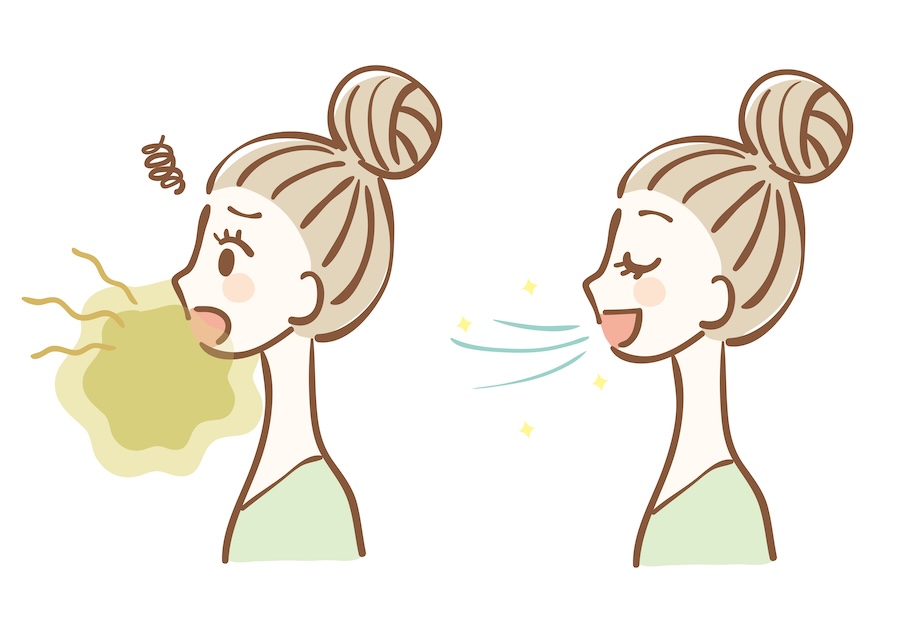
When Should I Be Concerned About My Bad Breath?
February 14, 2025 9:00 amBad breath happens to everyone at some point. Maybe you had garlic bread for dinner or skipped your morning brush before coffee. But, it’s usually nothing a toothbrush or mint can’t fix. Occasional bad breath is normal, but persistent bad breath (halitosis) may signal a bigger issue. So, when should you be concerned?
When is Bad Breath More Than Just an Annoyance?
Bad breath isn’t always a big deal, but some signs shouldn’t be ignored. You may need to see a dentist if:
- Your bad breath won’t go away: If brushing, flossing, and mouthwash don’t help, bacteria may be hiding in places you can’t reach.
- You have a dry mouth: Saliva washes away food and bacteria. A constantly dry mouth allows odor-causing bacteria to thrive.
- Your gums bleed or feel swollen: Gum disease is a leading cause of bad breath and can lead to tooth loss if untreated.
- You have a lingering bad taste in your mouth: This can indicate an infection, cavities, or even acid reflux.
- Others notice your bad breath: If a friend or loved one has mentioned it, it may be worse than you realize.
How to Get Rid of Chronic Bad Breath
If bad breath isn’t improving, it’s time to go beyond breath mints and tackle the root cause. Here’s what you can do:
1. Improve Your Oral Hygiene Routine
Brushing twice a day is great, but are you brushing effectively? Make sure you’re brushing for two full minutes and don’t forget your tongue, where odor-causing bacteria love to hide. Flossing daily removes food and plaque from between your teeth, a common source of bad breath.
2. Get a Professional Deep Cleaning
If plaque and tartar have built up beneath the gumline, a regular cleaning may not be enough. A deep cleaning (scaling and root planing) removes bacteria from hard-to-reach areas, reducing odors and improving gum health. If your gums bleed when you brush or floss, a deep cleaning might be exactly what you need to eliminate bad breath at the source.
3. Treat Cavities or Infections
Tooth decay and infections don’t just cause pain—they can also lead to persistent bad breath. If bacteria hide inside a cavity or an untreated infection, no amount of brushing will make the odor go away. Treating cavities with fillings or root canals can help get rid of the problem for good.
4. Boost Saliva Production
A dry mouth is a breeding ground for bacteria. Saliva helps wash away food particles and neutralize acids. Drinking plenty of water throughout the day can help, but if dry mouth is a constant issue, saliva-boosting rinses or sugar-free gum can encourage saliva flow and improve breath freshness.
5. Make Smart Diet Choices
Some foods, like garlic, onions, and coffee, leave lingering odors. Cutting back or rinsing your mouth after eating them can help keep your breath fresher. Eating crunchy fruits and vegetables, like apples and carrots, can also help clean your teeth naturally.
6. Remove Tonsil Stones
Tonsil stones are small, smelly buildups of food and bacteria that get trapped in the tonsils. If you’ve ever coughed up a tiny white or yellowish lump that smelled terrible, that was likely a tonsil stone. Gargling with warm saltwater or using a water flosser can help remove them. If they keep coming back, your dentist can provide additional solutions.
Halitosis Solutions at Beaufort Center for Dentistry in Beaufort, SC
Bad breath can be frustrating, but it’s also treatable. At Beaufort Center for Dentistry, Dr. Louis Costa III can help find the cause and recommend the best solution. Whether it’s a deep cleaning, treatment for gum disease, or simple adjustments to your oral care routine, we’ve got you covered.
If halitosis is bothering you, schedule a visit with us in Beaufort, SC, today! Fresh breath and a confident smile are just an appointment away.
Categorised in: Dental Tips


